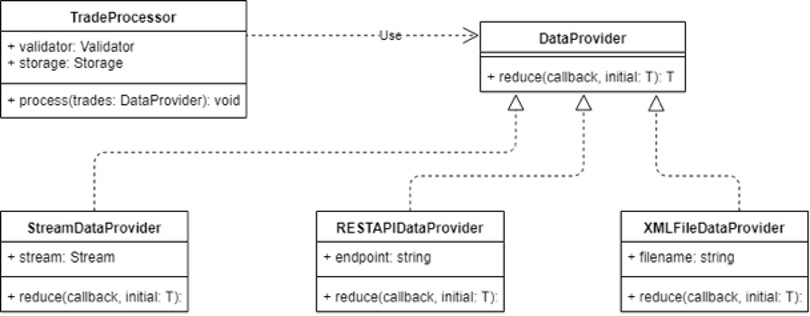Open Closed Principle (OCP)
- Software entities (classes, modules, functions, etc.)
should be open for extension- It means that the behavior of the module can be extended
- When the requirements for the application change, we add new behavior to the module to meet the changed requirements
but closed for modification- It means that extending a module's behavior does not involve changes to the source code of the module
- the entity can allow its behavior to be extended without modifying its source code
- In other words, we should be able to change the behavior of the module without changing the module itself
2 types
- Both ways use generalizations (for instance, inheritance or delegate functions) to resolve the apparent dilemma, but the goals, techniques, and results are different
Meyer's open-closed principle
- A module is open if it is still available for extension
- e.g.: it should be possible to add fields to the data structures it contains, or new elements to the set of functions it performs
- A module is closed if is available for use by other modules
- This assumes that the module has been given a well-defined, stable description (the interface in the sense of information hiding)
- A class is closed, since it may be compiled, stored in a library, baselined, and used by client classes
- But it is also open, since any new class may use it as parent, adding new features
- When a descendant class is defined, there is no need to change the original or to disturb its clients
Polymorphic open-closed principle
- open-closed principle refer to the use of abstracted interfaces
- where the implementations can be changed and multiple implementations could be created and polymorphically substituted for each other
- this advocates inheritance from abstract base classes
- Interface specifications can be reused through inheritance but implementation need not be
- The existing interface is closed to modifications and new implementations must, at a minimum, implement that interface
Example
- When we removed data retrieval, parsing and saving from
TradeProcessorclass and created separate class for each type of responsibility, we madeTradeProcessorclass to conform to OCP- If the requirements change, we can get completely different functionality without changing the TradeProcessor itself
- Suppose at some point we were given requirement to support multiple data sources at the same time (stream, REST API and XML file)
- It is not a problem for us
- We can use polymorphic DataProvider in TradeProcessor
- As you can see on the diagram below, we have created classes for every data source:
StreamDataProvider,RESTAPIDataProviderandXMLFileDataProvider- All of them are inherited from base
DataProviderclass and overridereduce()method - So, in the future, whenever we need to receive data from some new sources, we will do exactly the same thing
- Therefore, OCP is not violated
- We are closed for modifications (no need to change DataProvider class) and at the same time we are open for expansion

Single Choice Principle
- Suppose we have a hierarchy of classes designed to import data from files of different formats
- We also have a factory method that creates the required Importer depending on the file extension
- Does the implementation of such a factory comply with the OCP?
- Or do we need to introduce an ImporterFactory interface and factory hierarchy to comply with this principle?
- The factory method by itself already hides the way to get the desired Importer from its customers and an additional level of indirection is not needed here
class ImporterFactory {
public static create(fileName: string): Importer {
switch (getExtension(fileName)) {
case "json":
return new JsonImporter();
case "xls":
case "xlsx":
return new XlsImporter();
default:
throw new Error("Extension is not supported");
}
}
}
- according to
Bertrand Meyer- It is necessary to admit the possibility that the list of variants, given and known at some stage of program development, may subsequently be changed by adding or removing variants
- To ensure that this approach to the software development process is implemented, you need to find a way to protect the program structure from the impact of such changes
- Hence, follows the principle of Single Choice
- In other words: whenever a software system needs to support multiple alternatives, only one module of the system should know the complete list
Summary
- essence of OCP
- design modules so that their functionality can be expanded with other modules if requirements change
- new functionality should appear only by creating new entities and composing them with old ones
- design modules so that, ideally, their code does not need to be changed when requirements change
- there are always changes that cannot be made without changing the code of some module
- no system can be 100% closed
- therefore, a strategic approach is important when designing
- it is necessary to determine from which changes and which modules you want to close
- there are always changes that cannot be made without changing the code of some module
- design modules to relate to each other through abstractions rather than specific implementation
- the principle encourages linking entities through abstractions (rather than implementation) where business requirements may change
- design modules so that their functionality can be expanded with other modules if requirements change
- benefits of OCP
- reduces the amount of code that needs to be changed as business requirements change
- makes modification safe and relatively cheap
- the goal of OCP is to minimize changes to existing classes when new functionality is added
- It is achieved by adding extension points (not just inheritance) that allow us to take advantage of powerful tools like composition, aggregation, and polymorphism